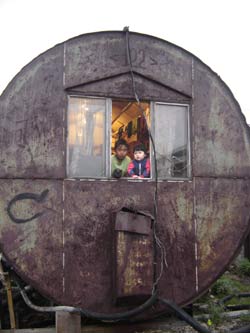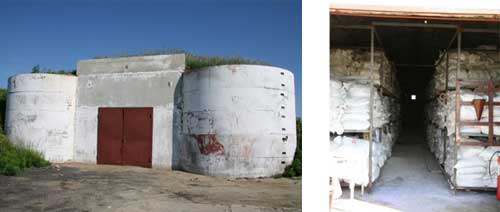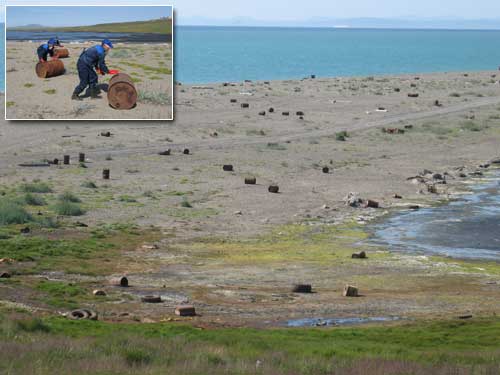The “Greening” of the Arctic
Tuesday, October 7th, 2008About the authors: Bob Dyer and Ella Barnes, Office of International Affairs, have managed work on the reduction of toxic and hazardous wastes in the Arctic under both the multilateral Arctic Contaminants Action Program (ACAP) and the Arctic Military Environmental Cooperation (AMEC) Program for over 10 years. Bob Dyer chaired the ACAP Working Group under the Arctic Council from 2004 to 2008, and Ella Barnes is the U.S. Representative to the ACAP Working Group.
If you stood with me at the northernmost point of the Chukotka Peninsula in Russia, on the shores of the frigid Arctic Ocean, what would we see? A star-filled sky, the Aurora Borealis, whales, walruses, perhaps a lost polar bear… But there is something that the eye cannot see: high concentrations of contaminants, from radioactive materials to pesticides.
 A Chukotka family has set up residence in an abandoned hazardous waste tank. A Chukotka family has set up residence in an abandoned hazardous waste tank. |
The Arctic is fragile, and is an early warning indicator of the state of the larger planet. Almost all Russian rivers flow to the north, where contaminants accumulate in seaweed, fish, birds, and mammals. Through the subsistence food chain these contaminants quickly find their way into the bodies of indigenous people where they stay for years. Native Americans in the Arctic, who neither produced nor used these chemicals, are at risk.
Since 2004, EPA’s Bob Dyer has chaired and I have represented the U.S. at the Arctic Contaminants Action Program (ACAP), which includes the U.S., Canada, Denmark, Finland, Iceland, Norway, Sweden, and Russia. Working together with our partners, EPA is helping to greatly reduce environmental contamination in the Arctic.
ACAP, under EPA leadership, organized the effort which to date has resulted in inventory, analysis and safe storeage over 4,000 metric tons of obsolete and prohibited pesticides in the Arctic and sub-Arctic regions of Russia. Prior to this project, the contaminants were released directly into those northward-flowing Russian rivers and transported to the Arctic.
Thanks to the pesticides management program we initiated, Russian regions are now contributing their funds and manpower in development of creative solutions to pesticides storage. For example, they have converted an abandoned missile silo in Altai Krai, Southern Siberia, into an effective storage facility for legacy pesticides.

A Pokrovka former missile hangar was dismantled under the US Cooperative Threat Reduction Program. In 2007 it became an interim storage site for obsolete and prohibited pesticides under the ACAP Project.
Bob and I are particularly proud that, during the recent EPA chairmanship of ACAP, the program has created and implements a model environmental justice empowerment program in Russia called the Indigenous Peoples Community Action Initiative. This sustainable and replicable project has already resulted in the removal and safe storage of over a metric ton of PCBs and persistent organic pollutant pesticides from remote indigenous villages in Alaska and northern Russia.
A community elder in Chukotka, Russian Far East, told us that he lived with drums containing spent oils, lubricants, and transformer liquids all his life and they are a part of his landscape. EPA is helping to change that–this summer, through the ACAP Program, over 2000 drums were removed from two Arctic indigenous villages in Chukotka on the Bering Sea across from Alaska.
Residents of Lorino and Lavrentia, Chukotka Autonomous District removing hazardous waste drums.


